- A 1,000-tsubo "miracle" office in a prime downtown location that brings PwC closer to its customers
- An advanced office that enables mobile work and improves the frequency and quality of interaction
- A single team, including building representatives, completes the project with remarkable speed
- A progressive office culture making effective use of space through measures such as shared personal lockers
- Achieving diversity by switching from an ownership mentality to a membership mentality
PwC Consulting LLC
*This article is based on the interview conducted in April 2016; some details may differ at present.
The Japanese Arm of the World's Largest Professional Services Network Opens a New "Frontline Base" in Tokyo's Marunouchi District
PwC (PricewaterhouseCoopers) is one of the largest professional services networks in the world, with over 208,000 staff in 756 locations (cities) across 157 countries.
PwC Japan Group provides services relating to areas such as auditing, consulting, deal advisory, and tax services. In March 2016, it established a new "frontline base" in Tokyo's Marunouchi district to deliver rapid, multifaceted support to customers. We spoke to some of the people involved in the new office's role, concept, and more.
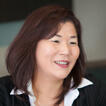
Yuko Sugiyama
Director, General Affairs
PwC Consulting LLC
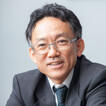
Kiyohiko Ozawa
President
Douma Co., Ltd.
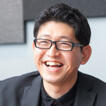
Daichi Amano
Design Director, Principle
Gensler and Associates International Ltd.
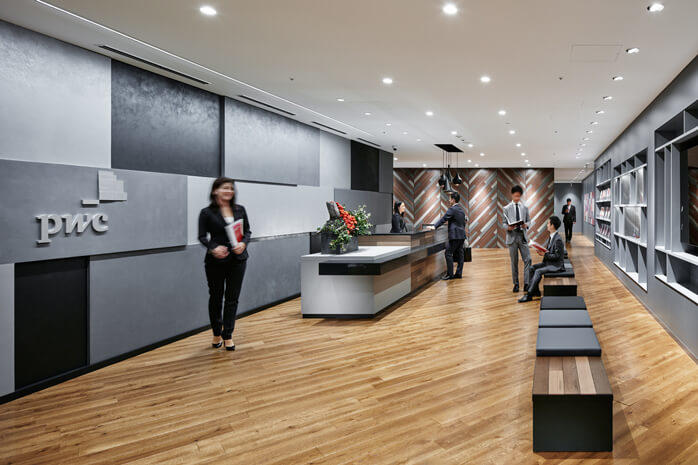
Entrance
Brief Memo
A 1,000-tsubo "miracle" office in a prime downtown location that brings PwC closer to its customers
In November 2009, member firms and their subsidiaries belonging to the PwC Global Network in Japan (which currently include PwC Consulting LLC, PwC Advisory LLC, and PricewaterhouseCoopers Aarata), which had previously been dispersed across six different locations, integrated their operations at a single site: the Sumitomo Fudosan Shiodome Hama-Rikyu Building in Tokyo's Ginza 8-chome district (Chuo Ward).
Subsequently, as the business grew thanks to the economy's recovery from the global financial crisis and hiring increased accordingly, the Shiodome office started to become too small. As a result, in March 2016, PwC Japan opened a new office, this time in the Marunouchi Park Building in Marunouchi 2-chome (Chiyoda Ward).
Yuko Sugiyama: "Three companies in PwC Japan's consulting practice combined to establish the new PwC Consulting LLC, which offers comprehensive consulting services from strategy through execution. It was this unit that moved to the Marunouchi office, which therefore serves as a 'frontline base'."
The Shiodome office extends across ten floors within one building, and according to Sugiyama, the environment could be stressful due to factors such as having to wait a long time for the elevator when moving up and down between floors. For that reason, it was determined that the new office would be a single-floor environment where people would not have to go up and down between levels.
Sugiyama: "The most important reason for selecting Marunouchi was that it is located close to our customers. The goal was to have an office environment that facilitates client-facing interactions."
Needless to say, rents are steep in a prime location such as Marunouchi. However, whereas the consulting division was using a total of around 1,350 tsubo of floor space before, it is only using about 1,000 tsubo in the Marunouchi office (although this is expected to increase in future as more staff are hired). What's more, since some 300 tsubo of this is devoted to conference rooms, the actual working space is around 700 tsubo. Despite the fact that the working area has been almost halved, there is plenty of space to accommodate every staff member.
Sugiyama: "I call it the '1,000-tsubo miracle.' Also, when we looked at employee expenses at the Shiodome office, we found that costs such as taxi fares and commuter train passes were quite a bit higher. It's not a trivial amount of money. When you consider that as well, I think you can say that, overall, there's been an improvement in our office costs."
One reason for this is that fares on the line mainly used by employees at the Shiodome office are high compared to other lines. All the same, it really does seem a miracle when you consider that the firm was actually able to lower its costs by setting up a new office in a prime location--thanks to shrinking its floor space and reducing transportation expenses.
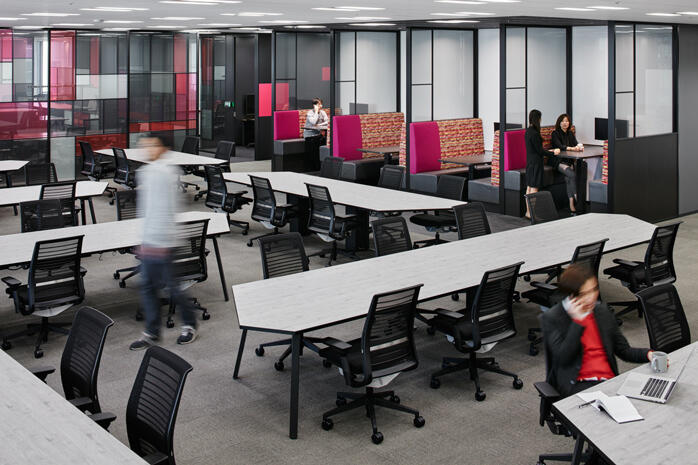
Office
An advanced office that enables mobile work and improves the frequency and quality of interaction
The concept for the Marunouchi office was to be aligned with the concept of the Shiodome office while serving as a "frontline base" that would enable PwC to be closer to clients and build stronger relations with them. To achieve this, development was handled by Douma Co., Ltd., which had created the concept for the Shiodome office, and Gensler and Associates International Ltd., which had designed it.
Sugiyama: "It's like the sequel to a movie, where the script is written by the same people as the original."
Kiyohiko Ozawa: "For the new office, just like the previous one, we surveyed all the staff about their working habits, and to be honest, I was surprised at how much things had evolved. Within the past seven years, the time spent interacting with the clients who are our core business has increased by about 50%, and conversely, the time devoted to office work at the company had decreased by 50%. In terms of both its direction and speed, I really think the company's evolution has been ideal."
During that seven-year period, there have also been significant changes in the various types of electronic devices used in the business world. This is most readily apparent in the transition from cell phones to smartphones. Along with hardware, software has also undergone rapid evolution.
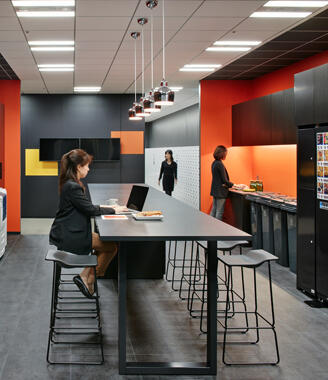
Social Cafe
Sugiyama: "A key issue at the Marunouchi office, since it involved the integration of three companies, was improving the frequency and quality of interaction. Before the move, people were using devices of various types, but we established consistent standards and made Wi-Fi accessible throughout the entire office. Our aim was for it to be an advanced office that enables mobile work."
Previously, for cost reasons, conventional projectors were sometimes used instead of monitors for teleconferencing and the like, but now, thanks to significant reductions in the prices of AV equipment, all projectors have been replaced by TV monitors.
Sugiyama: "Two years ago, when a PwC global meeting was held at the Shiodome office, I felt really proud when one of the PwC country leaders who was taking part from another country praised the office's world-class conference rooms. It made me appreciate the speed with which Japan's office environment evolves."
A single team, including building representatives, completes the project with remarkable speed
As part of an international network, it was necessary for PwC Japan to follow certain common global PwC guidelines when designing the Marunouchi office, and since the design had to be checked at each stage, it took quite some time before everything was agreed on. However, besides representatives from PwC and the concept and design firms, representatives from the building were also involved in meetings right from the start, and with everyone working together as one team, progress was smoother than expected.
Sugiyama: "Starting from July 2015, we held meetings once a week and we were able to decide everything by mid-October. The building representative told us that this was remarkably fast."
Daichi Amano: "Basically, with PwC's global branding in mind, we proposed a design that incorporated the brand into the framework. Our intention was to create an environment that everyone at the company would feel proud of and that would naturally generate a sense of belonging."
The schedule from the time the design was finalized until the work had to be completed allowed no margin for error, but all of the team members, including the building representatives, were on the same wavelength and worked on the project with a strong determination to make absolutely sure it was completed on time.
Amano: "Everyone had an opinion, but when it came to each issue or request, the debate was not about 'Can we do this or not?'--instead, for the most part, it was a positive discussion about 'How are we going to do this?'"
Ozawa: "It's very difficult to visualize the process of creating a structure. However, it's easier to approach it if you think about things in terms of what the office will look like after it's completed. I think it was good that we looked at the visual elements in detail during our meetings."
A progressive office culture making effective use of space through measures such as shared personal lockers
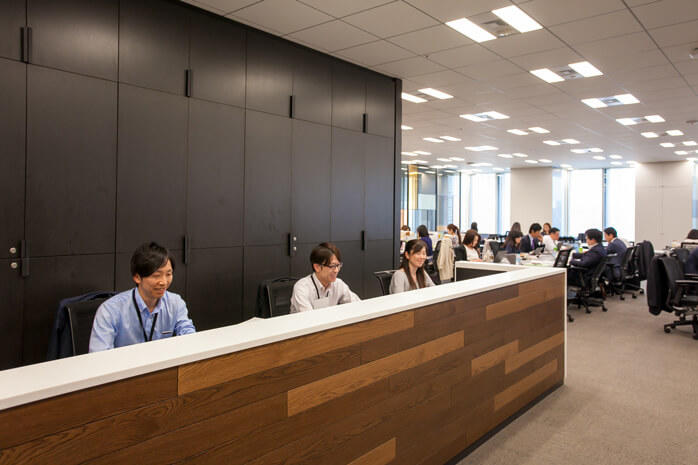
Concierge Desk
The purpose of the reorganization of the PwC Japan Group* that was behind the construction of the Marunouchi office was to offer clients more highly specialized services that would reliably ensure a competitive advantage on the global market. It was essential to have stronger-than-ever collaboration with the PwC Global Network and establish the image of a powerful professional team. To achieve this, an environment was needed that would make employees' day-to-day work a platform for continuing to innovate at an even faster rate.
*PwC Japan Group represents the member firms of the PwC global network in Japan and their subsidiaries. Each firm of PwC Japan Group undertakes its business as an independent and separate corporate entity. To address complex and diversified business challenges, PwC Japan Group consolidates expertise of assurance, deal advisory, consulting, tax and legal services as well as enhances its structure in order to cooperate organically.
Visit the following URL for a press release explaining the reorganization: http://www.pwc.com/jp/en/japan-press-room/press-release/2016/pwcjapan-organization160201.html
Ozawa: "Even before the Shiodome office, I've always thought that PwC Japan was very progressive among Japanese businesses, and since it moved to Shiodome, the speed with which it evolves has clearly accelerated. It seems that a major factor in this was the implementation of a shared one-company culture throughout the entire organizations thanks to the 2009 integration and relocation."
Introducing new technology or moving office are typical examples of measures undertaken by all kinds of companies every day--but even if the surrounding work environment changes thanks to such measures, it means nothing unless the employees are able to independently and proactively make effective use of its benefits. In the case of PwC, making full use of the new environment leads to new services and offerings.
When PwC Japan integrated its operations during the previous move to the Shiodome office, Ozawa notes that he felt the idea of using the new environment's benefits seemed to be rather conceptual. However, at the new office, thanks to the evolution of the organizational culture, he believes the employees are strategically, practically, and instinctively able to make effective use of the new environment's benefits.
Amano: "In terms of the design concept, by combining various elements in an integrated, multi-layered manner, we aimed to create an office where you can feel a sense of depth, of history, of the business's scope. There are new discoveries to be made in each area, and these were designed to be understood intuitively, rather than theoretically."
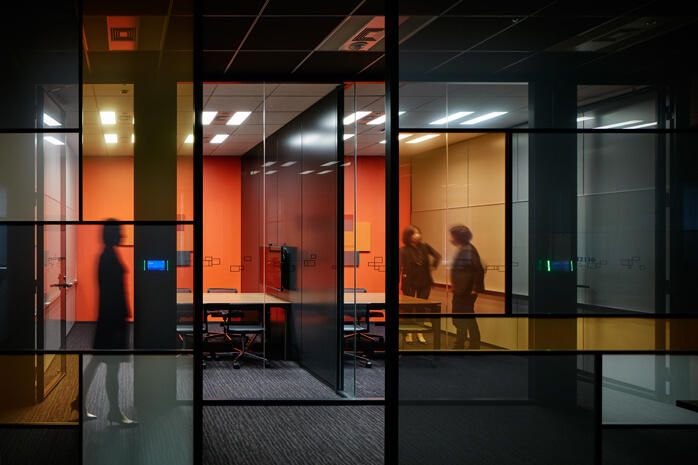
Meeting Room
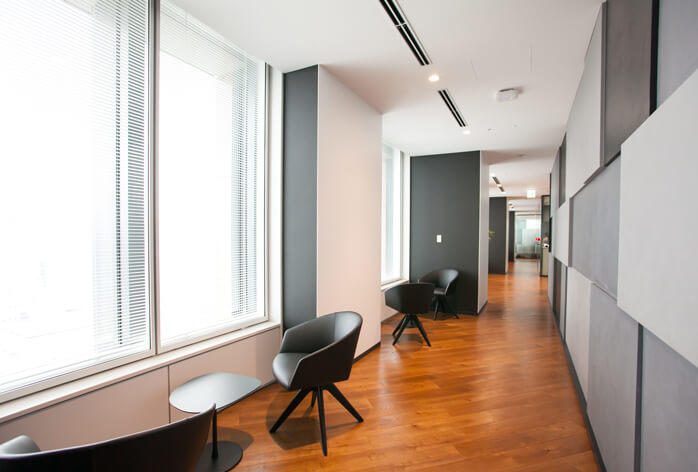
Free Space
With regard to functionality, Amano notes that PwC is already a step ahead of its contemporaries when it comes to the basic thinking around offices.
Amano: "That's why I believe PwC Japan is a group of extremely cutting-edge professionals. At both the management level and the level of individual players, it's made up of forward-thinking personnel. And because that's the kind of people they are, I'm sure they'll be able to take full advantage of this office's benefits."
The company's unique way of using the office is exemplified by its approach to storage, says Amano. While its reservation system for meeting rooms and the like also makes effective use of sophisticated technology, it was the personal locker-based storage system that particularly impressed him.
Ozawa: "Usually, when you talk about personal lockers, you assume that one locker is provided for each employee. But as the number of staff increases, you will need quite a lot of space just for lockers alone. They have resolved this problem with a really unique concept--a system of 'sharing' personal lockers. The actual inspiration for this came from the members' lockers you often see at golf courses or spa facilities, which are managed using an ID system."
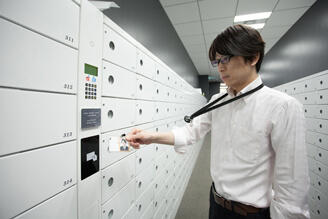
Shared Personal Lockers
Sugiyama: "Since all staff members are not necessarily working in the office all the time, we thought it would be good if the people who are there could use the lockers of people who aren't there. As a measure to prevent problems like people losing their key or forgetting their code, staff ID passes are used to open the lockers."
It's not just lockers: employee IDs are used to manage the use of all fixtures and devices at the Marunouchi office. In addition to facilitating matters as much as possible from both a management and user perspective, this is intended to reduce costs such as labor expenses. Employing "flexicurity" (i.e., a combination of flexibility and security) when implementing measures has enabled an office management system that operates in a more professional manner.
Sugiyama: "Another significant benefit of the ID passes is that their logs can be managed. What's more, in this office, we've introduced a concierge desk system for the first time. This enables employees to receive virtual support for IT device-related office tasks, such as setting up a teleconference, from young staff who have expertise in IT and electronic devices. We had already come up with this concept at the Shiodome office, but it had to be abandoned for various reasons. This time, we were able to make it work."
Achieving diversity by switching from an ownership mentality to a membership mentality
The virtual support introduced at the Marunouchi office is handled by homeworkers who are in their forties or older and have returned to work after a period of maternity or parental leave. In Japan, this system has just started, but it has already been in place at PwC US for five or six years.
Sugiyama: "In setting up the new office, we focused on creating an office that was truly open to diversity. In Japan, when you talk about diversity in the workplace, it tends to be limited to the idea of providing more opportunities for women, but fundamentally, I think it means adopting an approach that is willing to accept a wide range of ideas, even those that are unpopular. It's important to act based on ideas that make sense, rather than ideas that are popular."
The office, says Sugiyama, is an important key to achieving this.
Sugiyama: "To help us find the right office, Sanko Estate prepared documents that met our needs and regularly provided us with information over an extended period of time."
She also speaks about the importance of a membership mentality.
Sugiyama: "The moment that people start insisting they want personal lockers to be provided for them, you are confronted with an ownership mentality. While the locker-sharing system is partly down to reasons of space, it was assumed that sharing would also have the effect of instilling a membership mentality. That mentality means that staff will have a greater awareness of themselves as true heirs to PwC's DNA that has been established over the years."
Ozawa: "Diversity is a word that's used a lot, but there are still not many places where it has actually been achieved like at PwC. What's more, the company has achieved a level of perfection with its system that allows it to be supplied directly to customers as is. That's why I honestly believe the employees at PwC are amazing."
In June 2015, the PwC Global Network was selected for IMPACT 10x10x10, an initiative of UN Women (a United Nations organization dedicated to achieving gender equality and women's empowerment). Worldwide, ten heads of state (including Japanese Prime Minister Shinzo Abe), ten universities (including Nagoya University), and ten companies (including PwC) were chosen to participate in this project to promote women's empowerment as part of the HeForShe campaign.
Sugiyama: "Even today, I still clearly recall hearing the phrase 'Be Proud of PwC' on my first day at the company. That's why I want people to see themselves as members of the PwC global network well recognized worldwide, and I will try to pass that idea on to new colleagues who join the company in future."
